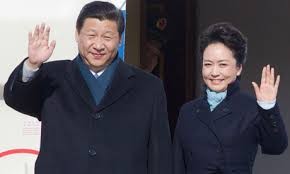Chinese President Xi Jinping's wife, Peng Liyuan, together with several other first ladies, called for a better environment and treatment for disabled people during the APEC Economic Leaders' Meeting on Monday.
The Chinese first lady, together with President Xi Jinping, welcomed other leaders and their spouses to the 22nd Asia-Pacific Economic Cooperation (APEC) Economic Leaders' Meeting held in Beijing.
Peng spoke before the APEC leaders and their partners about creating a better world for those with different abilities, more commonly known as "people with disabilities" or PWDs.
According to her, the world needs a better understanding of these people's struggles in order to provide them the necessary respect and care they need.
She also declared that it is the responsibility of all members of a society to share with them the fruits of social and economic development.
After the meeting, Peng accompanied the spouses of APEC member economies to visit an artwork exhibition showcasing art projects created by differently abled Chinese people, and even interacted with a group of hearing-impaired children who were playing puzzle games.
She and the other first ladies were even photographed making a thumbs-up signal to interact with a deaf-mute girl while Peng showed them how to communicate with some of the disabled children.
They also watched a cultural dance presentation executed by disabled performers from China.
The APEC leaders' wives include Singapore's FL Ho Ching, New Zealand's Bronagh Key, Japan's Fl Akie Abe, Indonesia's Iriana Widodo, Canada's Laureen Harper, Malaysia's Rosmah Mansor, Papua New Guinea's Lynda Babao and Thailand's Naraporn Chan-ocha.
According to China's State Councilor Wang Yong, the Asian giant is considering working with other countries in the Asia-Pacific in order to aid PWDs in becoming more involved in regional activities for them to enjoy the progress of the economy.



























